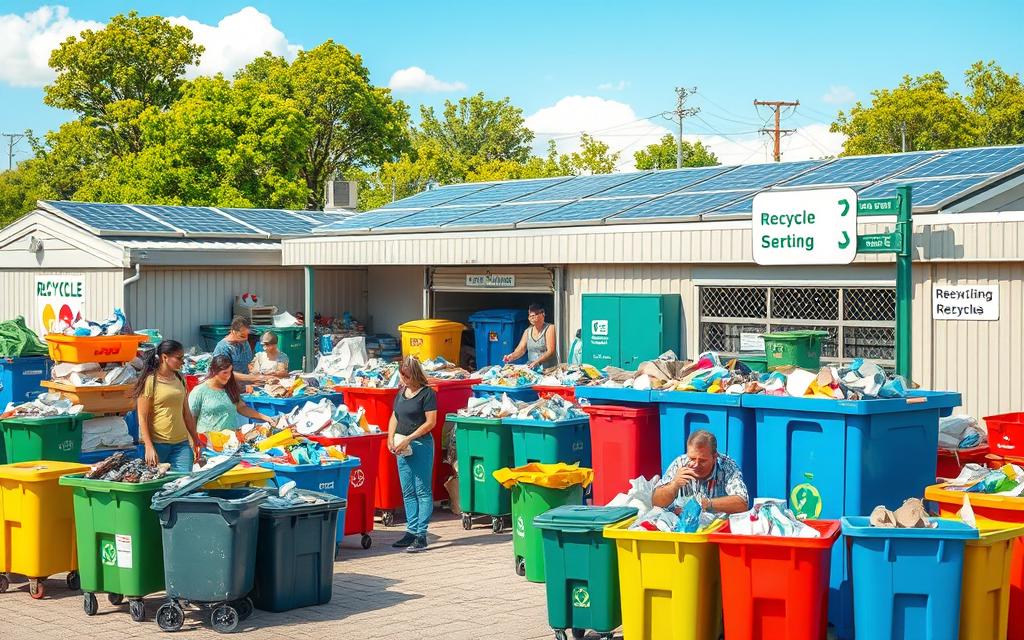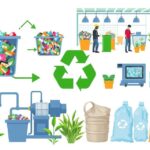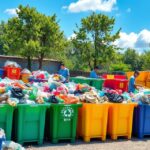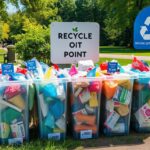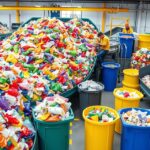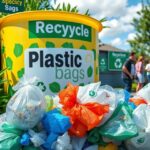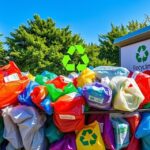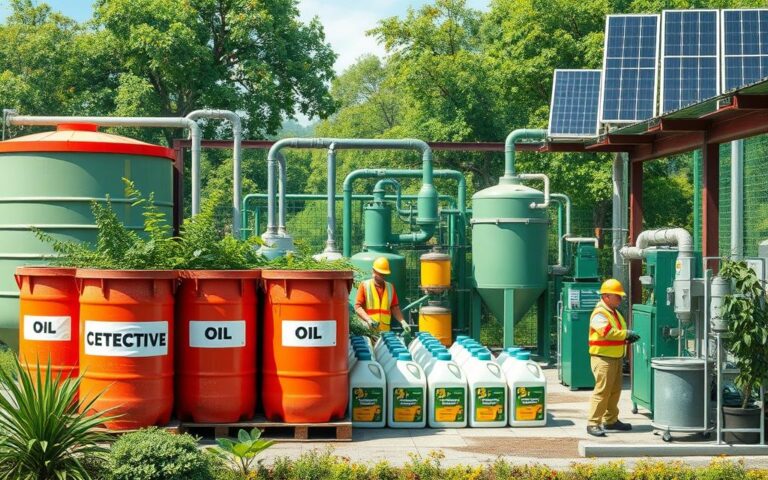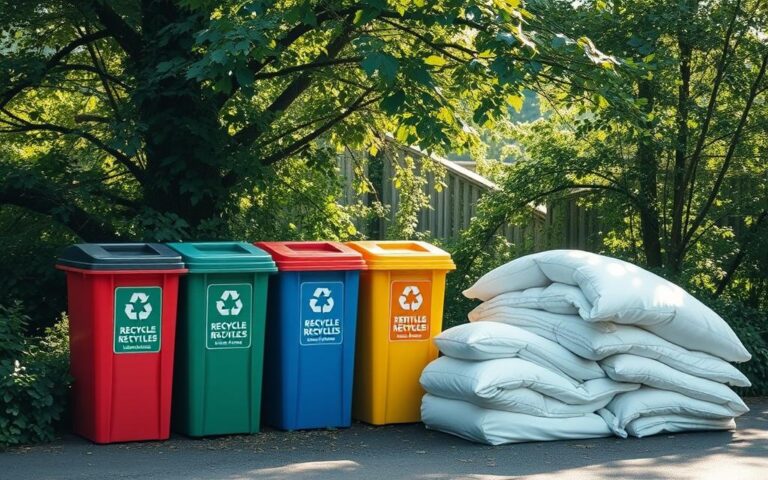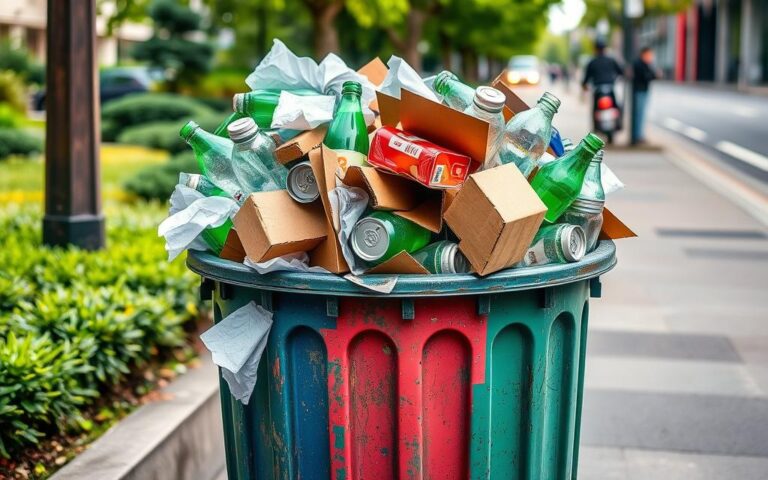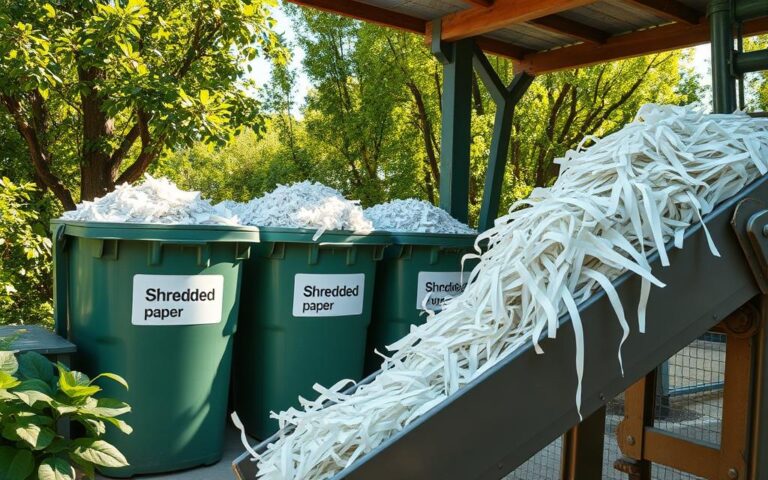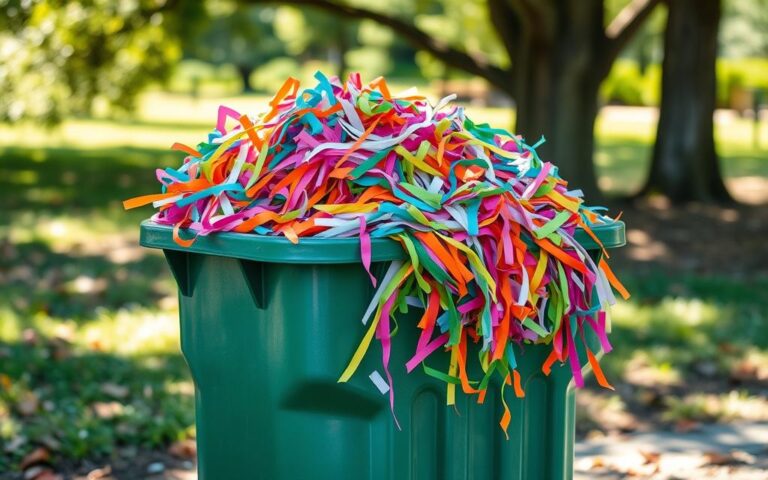Where Do I Recycle? Find Local Recycling Centers
Knowing where to recycle is key for supporting eco-friendly practices in our communities. Finding your local recycling centres makes it easy to get rid of materials the right way. This helps keep our environment healthy. Cities often have places where you can recycle different things, including special spots for glass. In Omaha, for example, people can drop off glass for free or use Glassman Recycling & Repurposing, although there might be a charge.
But it’s not only glass you can recycle. Things like plastic bags and films can also be recycled at some shops without costing you anything. There are also many online tools to help you find where to recycle what. With over 100,000 places listed in North America, finding where to recycle near you is easier than ever. If you need help straight away, just call the hotline at 1(800)CLEANUP to learn about recycling facilities near you.
The Importance of Recycling
Recycling is key to a green future. It helps cut down waste and save energy. It also conserves resources and builds recycling awareness in communities. Everyone’s recycling efforts make a big difference for the planet.
Environmental Benefits of Recycling
Recycling has a big environmental impact. It lessens waste in landfills and cuts pollution. It saves things like energy and resources too.
For example, recycling aluminium saves 95% of the energy compared to new production. Recycling paper means we need less wood, helping to save our forests. These steps are crucial as most resources we use are not renewable.
Economic Advantages of Recycling
Recycling helps our planet and our pockets. It creates jobs and generates billions in sales each year. For instance, recycling 10,000 tons of waste creates 36 jobs, much more than landfilling.
In Massachusetts, around 9,000 people work in recycling, boosting the state’s economy. Recycling offers economic growth while protecting the environment.
Community Impact and Awareness
Recycling brings communities together. When people recycle together, they support sustainable living. This effort can significantly lower the waste going to landfills.
Communities that focus on recycling see both environmental and economic benefits. Working together, we can build a sustainable future through education and action.
| Material | Energy Saved | Environmental Impact |
|---|---|---|
| Aluminium | 95% | Reduces mining waste |
| Steel | 60% | Saves water and reduces emissions |
| Plastic | 70% | Less landfill waste |
| Glass | 40% | Minimises silica sand extraction |
| Newspaper | 40% | Conserves trees |
How to Determine What You Can Recycle
Knowing what you can recycle is key to managing waste well. Learning about recyclable items and local rules makes it easier to follow them. This helps cut down on waste and supports a greener planet.
Commonly Recyclable Materials
Many materials can be recycled easily. Items that often go into recycling bins include:
- Paper: This makes up 23% of all solid waste yearly in Tennessee. By recycling, we save trees.
- Glass: This material can be recycled over and over, keeping its quality each time.
- Metals: Aluminium, for example, is easy to recycle and needs little energy to do so.
- Plastics: Specifically, those marked with symbols 1 and 2 are accepted by most recycling places.
Items Not Accepted in Curbside Recycling
There are items that shouldn’t be put in recycling bins to prevent contamination. These include:
- Coated paper products, like packaging materials.
- Snack bags and other multi-layer packaging, because they have different materials mixed in.
- Hazardous household waste such as pesticides and paint, which are harmful to the environment.
- Worn-out tires and e-waste like batteries and electronics, which need special disposal methods.
- Food and liquid leftovers in containers can contaminate, making the whole recycling batch useless.
Understanding Recycling Symbols
Knowing what recycling symbols mean helps identify what can be recycled. Usually, these symbols show the type of plastic. Symbols 3, 6, and 7 are often not recyclable, but some places might take 4 and 5. Always check your local rules to ensure you’re recycling correctly. By understanding these symbols, you help make your community cleaner.
Where Do I Recycle? Finding Local Recycling Centres
Finding the best recycling centres nearby can help a lot with managing waste locally. There are many tools to help you find where to recycle. By using the internet, talking to local authorities, or using mobile options, recycling becomes easier.
Using Online Recycling Databases
The internet is full of information on where to recycle. There are websites with databases that let you search for recycling centres by your postal code. This gives you up-to-date recycling info easily. These websites also tell you about special days to drop off dangerous waste.
For example, people living in NYC can use Special Waste Drop-Off sites for things not picked up normally. You can find more on this at the program’s webpage.
Contacting Local Waste Management Authorities
Getting in touch with your local waste management is a good idea. They have teams to inform you about recycling programs in your area and what you can’t dispose of. This ensures you recycle right, making the most of your efforts, and know where various materials can be recycled.
Mobile Recycling Services
Mobile recycling is changing how we deal with waste. Now, many places have mobile collection that comes right to you. This is great for those who can’t easily get to recycling centres. It means no need for transport and easy recycling right from home.
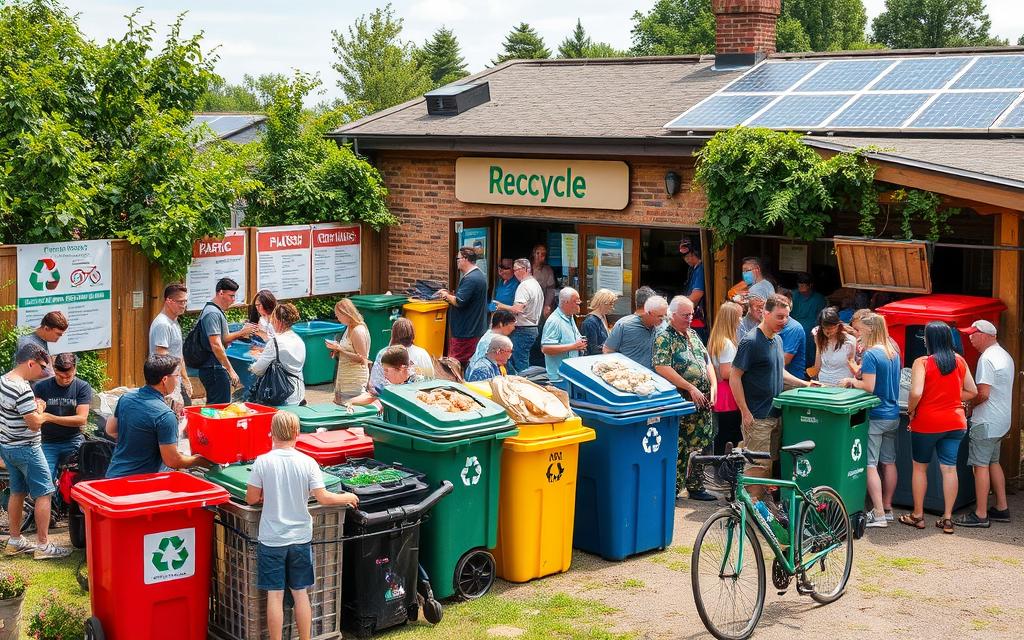
Tips for Successful Recycling
Making recycling work better is crucial. By following some tips, we can recycle more effectively and reduce mistakes. Knowing how to sort, prepare, and minimise contamination makes recycling more successful.
Proper Sorting of Recyclables
Sorting items correctly is key for recycling. You must separate recyclables from non-recyclables before binning them. Stuff like plastic bags and food containers can spoil the whole batch. Choose rigid plastics, mainly with codes 1 and 2, as they’re often recyclable. Always check your local rules for which materials are okay.
Preparing Materials for Recycling
Getting items ready to recycle is important. Clean and squash containers to save space and keep the batch pure. A single dirty item can spoil everything, so cleanliness is vital. Take off any tape and wrapping from cardboard to keep it in good condition for recycling.
Reducing Contamination in Recycling Bins
To cut down on recycling mistakes, know what’s allowed in your bin. Don’t guess – guessing leads to errors. Things like straws, lids, and soft plastics can jam up the machines, causing trouble. Following your area’s recycling rules helps make sure more items are correctly recycled.
Conclusion
Recycling is key to creating sustainable communities. This article has shown the broad benefits of recycling. It helps the environment, the economy, and society.
By recycling, we reduce waste, save important resources, and create jobs. This supports economic growth. Joining recycling programs helps build a circular economy. This leads to better resource use and stability for the future.
It’s important for everyone in the community to know about recycling. When people learn what they can recycle, we all get closer to our environmental goals. This makes our air and water cleaner. It also improves health and the places we live in.
Every step you take in recycling matters. Encouraging others to do their part can have a big effect. Let’s commit to good recycling habits. We should keep learning and sharing knowledge. Together, we can make our communities greener and healthier.
FAQ
What types of materials can I recycle at local recycling centres?
You can recycle paper, glass, some plastics, and metals. Always consult your local recycling centre for their rules.
How do I find my nearest recycling centre?
Find your nearest centre online or through local waste services. Call 1(800)CLEANUP for options in your area based on your zip code.
What should I do if I’m unsure about a particular item’s recyclability?
Check recycling symbols and local guidelines if unsure about an item. This helps make the right choice.
Why is it important to prepare materials for recycling?
Prepare materials by rinsing and crushing them. This makes recycling more efficient.
What are the environmental benefits of recycling?
Recycling cuts landfill waste, saves resources, and reduces pollution. It’s vital for our planet.
Can recycling create jobs in my community?
Yes, recycling can create local jobs. It brings economic benefits and promotes community participation in sustainability.
How can I reduce contamination in my recycling bin?
Follow your area’s recycling guidelines, avoid wishcycling, and only recycle correct materials to lessen contamination.
Are mobile recycling services available in my area?
Check with local authorities or initiatives for mobile recycling services in your area. Many places offer this for convenience.
What role does community awareness play in recycling?
Raising awareness boosts communal responsibility for sustainability. It motivates eco-friendly recycling actions.

